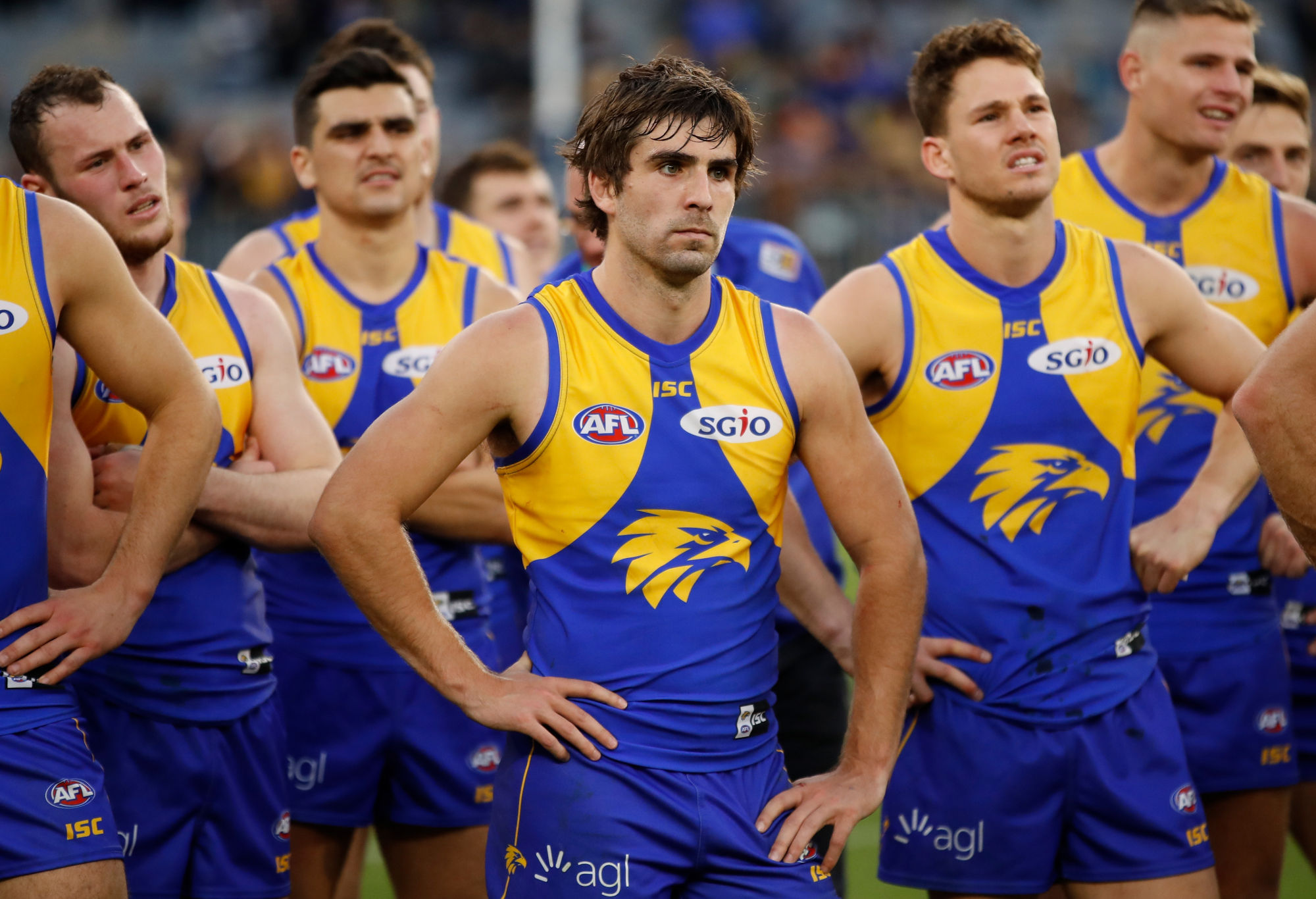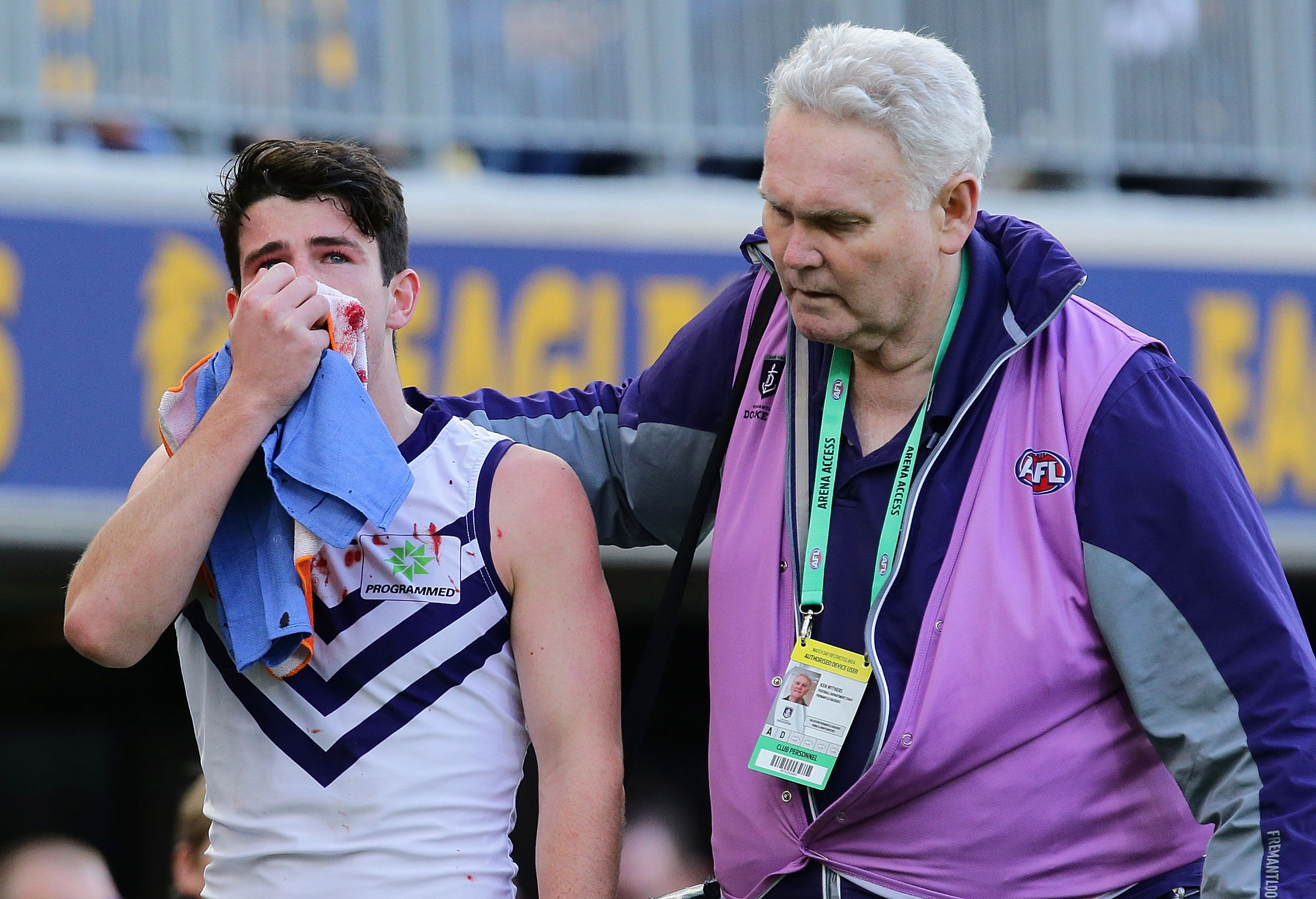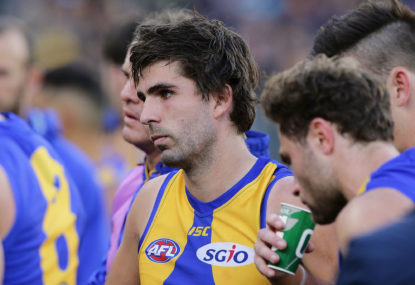It’s Andrew Gaff week, and while I’d prefer to be discussing him in the context of a Brownlow Medal win or premiership victory, the reality is neither of these are now possible in 2018.
Every football writer is duty bound to say their piece about the Gaff situation this week. Plenty of ground has already been covered: Gaff is a good person who did a terrible thing, Andrew Brayshaw didn’t deserve it, the eight-week penalty is about right, the police didn’t get involved but could have, etcetera etcetera.
Football is a team game with 44 players able to influence the outcome, but the loss of Gaff will dent West Coast’s premiership ambitions for this year. He has been the fulcrum of a midfield which has seen plenty of disruption in season 2018, be it the retirement of long-term workhorse Matt Priddis, the return and exit of Nic Naitanui, and injuries to his running mates (principally Luke Shuey).

Andrew Gaff of the Eagles (Photo by Michael Willson/AFL Media/Getty Images)
The Eagles now face the prospect of being without three of their best (maybe their three best) players for a crucial stretch of the season given Josh Kennedy’s minor leg injury gets less minor by the day. You’ve read that take too I’m sure.
There is a need to go further, and that is to discuss the AFL’s judicial system and approach to policing acts of violence on the field.
This is not a call for a red card – again, you’ve read that take – though given the means by which the AFL is examining every other aspect of the code it must be doing its diligence on this as well. The fact of the matter is the AFL experiences a significant act of violence like Gaff’s once or twice a year.
It is not endemic to the code; no one is completing the football equivalent of diving at an opponents shins (soccer), ramming helmet first into an unsuspecting ball carrier (American football) or attacking vulnerable fullbacks in mid air by tunnelling them (the rugby codes) on a regular basis.
No, what the AFL needs is to address something more fundamental in nature: the AFL needs to take action to stamp out all non-football acts of aggression and violence.
Striking, tripping, jumper punches, rogue elbows and forearms, anything that is outside of the act of legally competing for the football or defending your opponent from doing so has to be stamped out of the game.
Gaff said it himself: he meant to punch Brayshaw, but in the chest not the face. That he connected with Brayshaw’s jaw was merely an outcome – the intent was to strike, and that is what must be eliminated from the game.
The AFL’s judicial system has evolved over time to its current form, where the penalty handed down is most dictated by outcome, not intent. Take Hawthorn’s Daniel Howe’s tripping incident with Carlton’s Zac Fisher: his leg flicked out as countless others have before him to have been cited for tripping, but because he caught him so flush Fisher’s leg broke his penalty was amplified significantly.
Instead of a fine of $1,500 (0.4 per cent of the average AFL player’s salary – or about the equivalent of a mid level speeding fine for someone on the average Australian wage, but that’s another story for another time), Howe was banned for three matches.
Ditto Gaff’s strike. If Gaff had struck where he intended, he might’ve been on the pine for a week, if not been let off with a fine. As it was, because the outcome of the strike was so severe, his penalty was amplified.
But that is the secondary point. The fact of the matter is what Gaff did is the prime example of a non-football act. It was something that is not at all related to the play, that does nothing but invite the potential for disaster as we experienced this past weekend. No one benefits from strikes, trips, jumper punches or rogue elbows and forearms. All it does it invite opportunities for incidents like Gaff’s to arise.

Andrew Brayshaw (Photo by Will Russell/AFL Media/Getty Images)
That is in no way an excuse for his action. Not in the slightest. And from Gaff’s reaction to the incident it is crystal clear he is full of remorse and disappointment in himself. It is to say there is an unwritten code within Australian rules football that says it’s ok to punch so long as it isn’t too hard and it isn’t to a spot that has the potential to cause the opposition player a moderate to serious injury. That is what must change.
No other sport in the world would say striking an opponent “in the upper chest or neck area” is A-OK. They would say that’s a punch. And if you punch someone in any sport – even the extraordinarily violent National Football League in the United States – you’re gone. Our domestic approach to the action is a relic of a by-gone era and it is time the league moved with the times.
This requires reform to the league’s judicial arm. At a very basic level, the AFL should introduce a new classification of reportable offences, for what I would call ‘non-football actions’. These are acts that are outside of the legal means to contest the ball or defend your opponent: strikes, intentional trips, jumper punches and the like.
These acts should carry far heftier penalties than ‘football actions’ like rough conduct or high bumps, which are 99 per cent of the time the by-product of a careless move on the part of the perpetrator.
It’s arbitrary – we’ve all played the “I think this is worth that” game this week – but any non-football action should carry with it a base penalty of at least one week’s suspension. Crudely: you strike someone, you will miss next week’s game. If you grab an opponent’s jumper and push back in a punching motion you will miss next week’s game.
Perhaps it should be two weeks as a base, who really knows. The point is, the intent of the action must be punished proportionally to the outcome.
[latest_videos_strip category=”afl” name=”AFL”]
There are inherent grey areas in all of this, but there always has been greys and there always will be greys. It is not possible to codify everything – indeed, that was what led to the current system, after the desire to place every incident into a neat box on a matrix collapsed confidence in the system was lost. All we are seeking to do here is draw a very clear line around what is part of football and what is not.
If you don’t like the match review finding that you have executed a non-football action? Challenge it at the tribunal. Prove that you didn’t strike the person you struck.
The AFL’s own little ‘law and order’ set up has become a farce at times this year, with legal counsel for the league attempting to play a game of gotcha with the seriousness of the OJ Simpson trial. But all told, it is hard to argue any incident that has gone before the Tribunal has been resolved incorrectly in 2018. This aspect of the AFL’s judicial reform has mostly worked well and as intended.
But to date, the AFL has continued to ignore its tacit endorsement of strikes and other non-football actions. These acts have no place in modern football. If any good can come out of Andrew Gaff’s strike on Andrew Brayshaw, it is that the AFL will realise its approach to this issue must be addressed.
Could this extend further? The AFL has made it clear through all its “state of the game” talk that it wants the best and most skilful players afforded the time and space to do what they do best.
We see week in week out the best players are held, impeded, scragged and cajoled away from the ball, or right before the ball is in play. These, again, are inherently non-football actions, albeit of a far less extreme nature than putting your fist through your opponent’s chest. This, too, is something of a piece of nostalgia that has hung on for no reason other than it is what we’ve always done.
I don’t write this to be a reactionary. It is a long held belief of mine that the AFL doesn’t get it right when it comes to actions on the field that have nothing to do with playing football. The Andrew Gaff incident is merely an opportunity to start that conversation. I hope HQ seizes that opportunity.































































































